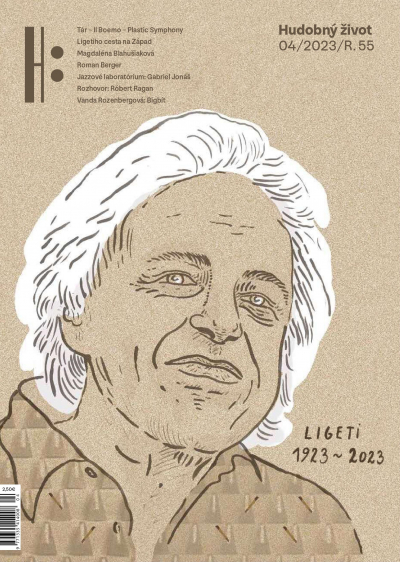
Hudobný život 4/2023
back to list

-
Autor:
rôzni
-
Category:
-
ISBN:
13 35-41 40
-
Published:
2023
-
Number of pages:
40
-
Price incl. VAT:
€2,50
-
Price without VAT:
€2.08
- Free delivery in Slovakia by Slovak Post!
-
Stock status:
In stock
- Order a subscription
- Buy a digital version
Disclaimer: Please note that Hudobný život, the magazine mentioned in this text, is written in the Slovak language.
INTERVIEW: Pavel Trojan (Prague Spring), Andrej Gál, Peter Javorka, and Juraj Vajó on the topic of Roman Berger, LIGETI 100 - György Ligeti and his musical journey to the West / Berlin Biennale: Red Carpet for Ligeti, MUSIC THEATRE: Anniversary of Magdaléna Blahušiaková, SND Opera: The Magic Flute, MUSIC AND FILM: Tár, Il boemo, and Plastic Symphony, STORY: Chasing the Scent of an Instrument; Ladislav Fančovič: Pursuit of a Little Coffin (the story of my contrabass saxophone), SUBITO with Eugen Prochác, EDUCATION: Percussion Instruments now at VŠMU, JAZZ - INTERVIEW: Robert Ragan, JAZZ LABORATORY: G. Jonáš - solo on Au Privave, GLOSS: G. Bianchi: Master and Margarita, Commedia - notes on two COVID albums by Sisa Michalidesová, SHORT STORY: Big Beat, CONCERTS, FESTIVALS, NEWS: Slovak Philharmonic - Juraj Valčuha - Wagner / State Philharmonic Košice - Benjamin Bayl, Kristina Fialová / Slovak Chamber Orchestra / ŠKO Žilina - Helge Dorsch, Oleg Shebeta-Dragan / Konvergencie 2023 / Banská Bystrica Music Spring - Matej Arendárik, Moyzes Quartet / Nitra - Spectrum Quartett / Brno - Brno Philharmonic, Milan Paľa / London - London Sinfonietta, Londinium Ensemble, Royal Academy of Music Manson, Martyn Brabbins / Cologne - WDR Funkhausorcheste, Juraj Čižmarovič, Frank Strobel / WDR Symphony Orchestra / Budapest Festival Orchestra, CD and Publications Reviews.
Art is like a cherry on top of a cake for some, and like a current that pushes everyday life towards higher meanings for others. To touch a work of art, to perceive it - that is an offer for anyone, but only the chosen were invited to create it. We admire and worship artists. The boundaries where natural respect for exceptional abilities ends and where cults begin are often unclear and do not only define the relationship between the outside world and artists, but also the risks of their own failures.
Three new films with a musical theme - two of them connected to the Slovak environment - raise questions about the meaning of artistic professions, the ambition to dedicate oneself to what one feels called to, and the price that is worth paying for it. It has been a long time since it was possible to encounter such a concentration of well-processed issues of musical professions on the film screen, with authentic depictions of the environment and work-related psychological relationships, as it was achieved in these three new films: Tár, Il Boemo, and Plastic Symphony. Moreover, the stories of the genius conductor of the Berlin Philharmonic, Josef Mysliveček, or the talented cellist Matúš, are not only about artists, about musicians. They depict images of abuse of power, the desire to fulfill dreams, the search for the meaning of life, and the confrontation with the changing world around us. They traverse through history, societies, and relationships as such...
"The wider our field of vision, the more complicated the world we are looking at seems, and the greater our desire for a moral sorting machine. Wouldn't it be wonderful if all shades of gray could be sorted into black and white? Clarifying again and again that such a machine does not exist and will never exist is the permanent mission of art." (R. Bayer: Three Shades of Gray)
To make a fundamental, risky life decision with the aim of living and creating freely, György Ligeti, who was 33 years old at the time, had to do the same when he decided to emigrate from communist Hungary in 1956. He exchanged the life of an artist navigating the minefields of socialist cultural doctrine for an uncertain future in the West. Today, 100 years after his birth, we already know that it was the right decision. Ligeti reportedly packed only a few scores into his suitcase while fleeing Hungary, testifying to his pre-exile compositions. It was precisely this period that Robert Kolář focused on:
"His compositional work initially showed signs of complete harmlessness, but even then it did not escape the increased attention of the regime. For example, in a pioneer's cantata, contrapuntal techniques reminiscent of Handel sparked criticism... ...Musica ricercata was meant from the beginning as 'music for the drawer,' and considering the prevailing circumstances and Ligeti's experiences with censorship, he probably did not even consider it for public performance." (György Ligeti and his musical journey to the West)
Fateful, lawful, and creative parallels with Ligeti can also be found in the work of Roman Berger, whose talents were also touched by the hands of the two worst totalitarian regimes of the 20th century. Three musicians, Andrej Gál, Peter Javorka, and Juraj Vajó, came together over scores and memories, offering comforting evidence of intergenerational sympathies in Slovak music. (Semplice - Patetique - Dolcissimo)
May inspirational music also assist you in making the right decisions.
Andrea Serečinová
